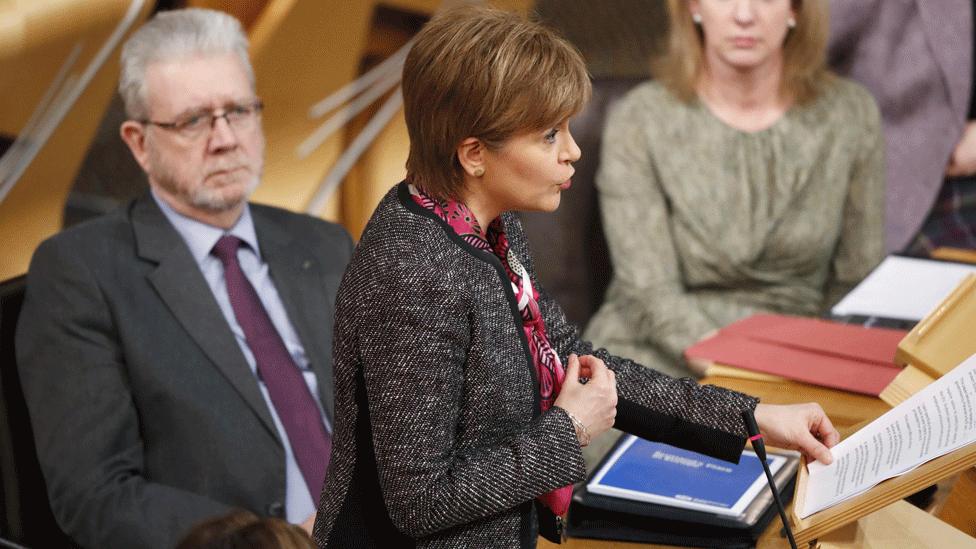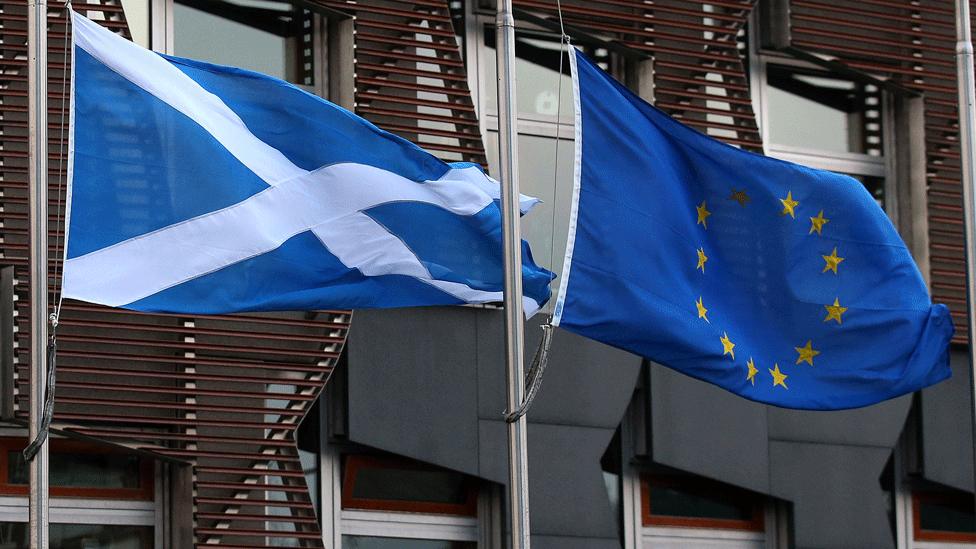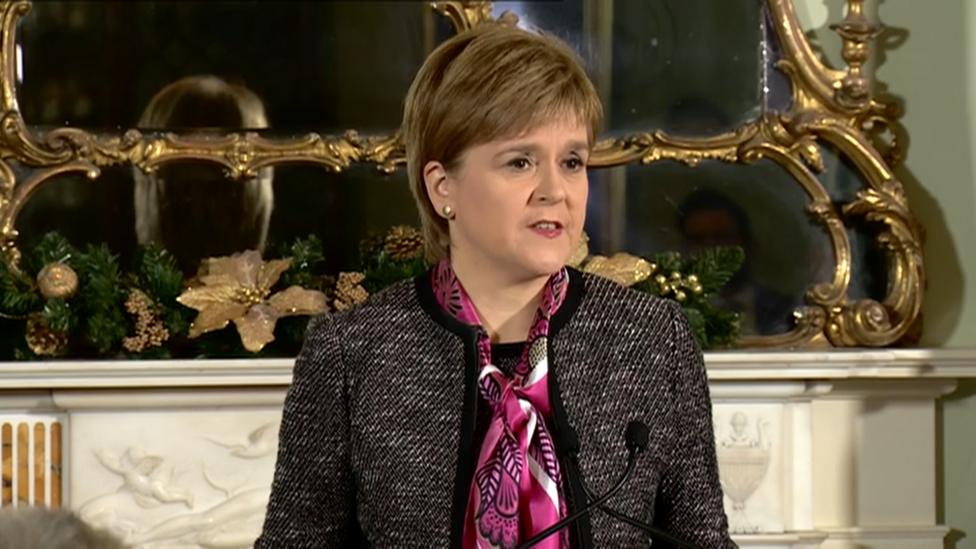Scotland's Brexit paper and its focus on strategy
- Published

Nicola Sturgeon made a statement to the Scottish Parliament on her Brexit paper
Policy and strategy. The proposals from the Scottish Government on the topic of Brexit are intriguing on both counts. Perhaps, however, it is the strategic element which will prove the most significant in the longer term.
To recap very briefly, Nicola Sturgeon makes three broad points.
One, Brexit is a Bad Thing (the capital letters are for those who enjoyed 1066 And All That.)
Two, the UK should seek to mitigate the likely impact by retaining access to the European single market.
Three, if the UKG won't pursue such a route, then they should enable Scotland to maintain access via the European Economic Area.
(Keen readers of these musings will know that this plan was mooted here more than a month ago. Those reports resulted, at the time, in Parliamentary questions and a notably unconvincing non-denial from the Scottish government. )
There is, of course, a fourth element implicit in the syllogism. That of indyref2, the prospect of a further referendum on Scottish independence.
Actually, Nicola Sturgeon made that prospect explicit by noting drily that there could be few involved in politics who had not yet grasped that the SNP favoured an independent Scotland.
So why, asked one member of the wicked media, did she not jump straight to indyref2? Because, she said, she was conscious of her responsibilities as First Minister, not just SNP leader. And she had promised to examine options within the UK.
What's the strategy?
Which brings us back to strategy. Firstly, Nicola Sturgeon is posing a challenge to the Labour Party. She is challenging them to say that, if they dislike Brexit, if they dislike Westminster Conservative control over, say, employment law, then they should follow her logic and argue for the devolution of substantial further powers to Scotland.
In response, Labour stressed its own proposals for a UK-wide convention and the possibility of federalism.
Secondly, the FM is posing a challenge to the PM. She is reminding Theresa May of the promise to consider the status of Scotland, to consider the support for the EU in Scotland's referendum out-turn.
In response, the PM noted today that she would indeed consider the SG proposals seriously. Very seriously indeed.
However, she added two points. That it would be the UKG which pursued a potential solution for the UK as a whole, factoring in Scotland. And, secondly, that consideration did not mean mute acceptance. There might be some proposals which proved "impractical".
Ms Sturgeon was speaking at her official Bute House residence in Edinburgh
Scottish Secretary David Mundell says a "Team UK" approach will benefit Scotland
Which brings us to another strategic element. Founded upon the fact that Nicola Sturgeon is not remotely surprised that her plans are not instantly acceptable to the UKG.
I am certain that they will be considered in detail by UK Ministers. They will be discussed within the Joint Ministerial Committee set up for such purposes.
However, there is little prospect of their being endorsed in full. For one thing, Conservative analysts believe Ms Sturgeon is "in denial" about the problems associated with her EEA plan.
They say it would potentially pose problems for trade within the UK if Scotland had a distinctive trading arrangement with European countries but rUK did not.
What about a Scotland/England border?
Scottish Ministers say that a customs border would not arise - because Scotland would leave the customs union if rUK did.
What about entry for EU/EEA citizens to Scotland? Why would they not just slip over the Border from, say, Gretna to Carlisle? Ms Sturgeon says that could be addressed by checks on employment and housing in England.
Further, SG Ministers say that a distinctive solution will have to be found for the island of Ireland. They insist it is not beyond the bounds of sentient thought to derive a distinctive solution for Scotland too.

The Scottish government wants Scotland to maintain a relationship with the EU
At which point UK Ministers revert to criticising the complexity of the Scottish plan: its need for the transfer of further, substantial powers to Holyrood - including at least partial control over immigration. They cite too the hostility which might arise in some EU countries which also have potentially secessionist territories.
Which brings me once more to strategy. Nicola Sturgeon is advancing these policy proposals with gravity and forethought. She genuinely argues that they could be workable - in the face of criticism - while acknowledging that they are "challenging".
But, alongside that, she has a longer term strategic imperative too. If a referendum on independence is to be called, Nicola Sturgeon wants to be able to convince the people of Scotland that she examined every possible alternative, that she worked seriously with the UKG to advance the interests of Scotland within the ambit of the UK.
She knows that a referendum called on a whim - or apparently driven by pique - would be less likely to result in victory for the SNP.
Let us recall the broad background here. Left alone, without the Brexit vote, I do not believe that the First Minister would currently be contemplating indyref2 for some years. Perhaps not until the next Holyrood Parliament.
However, Brexit changes things - as she reminded Tories at Holyrood who recalled that she had presently been cool towards the EEA.
It may prompt a range of responses. It will anger Nationalists who remember that membership of the EU was cited as a pro-Union plus during the 2014 plebiscite.
What of a second independence vote?
It may move some middle-class Scottish voters from a "No" vote on independence to a "Yes" vote as they are driven by their adherence to the European Union - and their vision of that collective approach vanishing.
It may, likewise, move some working-class Scottish voters from a "Yes" vote on independence to a "No" vote - as they are motivated by their dislike and distrust of the EU.
Ms Sturgeon may welcome the first development and believe that she can counter the second. Either way, she may feel - as voiced in an interview with me - that she has a "duty" to put the independence question to the people of Scotland once again.
She is cautious. She remains, for now, unpersuaded. She remains keen to discern the emerging shape of post-Brexit UK in order to understand the revised status quo against which she would be counterposing independence.
But the UKG is cautious too. Conservatives will voice doubts about the SG plan. But the Prime Minister and the Scottish Secretary will continue to treat them seriously. Very seriously. For now. Scottish and British politics: on hold. But intriguing. Always intriguing.
- Published20 December 2016
